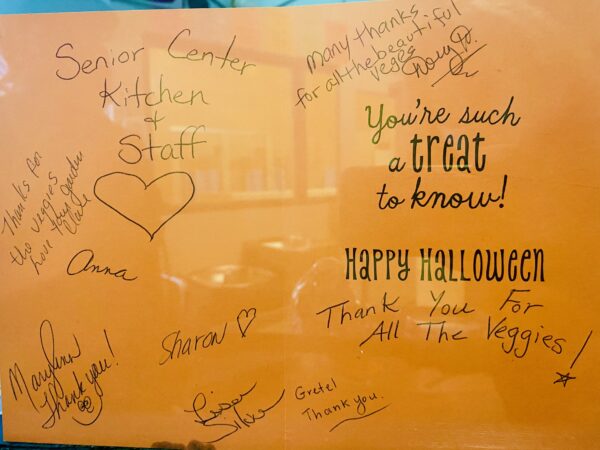A tenet of Unconditional Freedom is to fill what is empty and empty what is full.
Seven months ago, we started a mini-farm at Mendocino County’s Juvenile Hall, carving four, forty-five-foot beds into compacted, dry soil. We mixed in donated compost, added irrigation, and started planting with the kids.
We dropped in milkweed and carrot seeds, bush beans, strawberry plants, watermelon starts, and much more. Over the hot summer months, the dry landscape turned into a lush, edible oasis. The milkweed grew tall and swayed in the wind, becoming a habitat for caterpillars turning into Monarch butterflies. The Juvenile Hall kids loved harvesting and eating what they planted. Our fence wall became a backdrop for gigantic, 16-feet tall sunflowers. The pairing of barbed wire fencing and lush, green habitat was stunning and filled with meaning.
One current teenager was there in the very beginning, when we started planting. As is common, his sentence was short and he left. But just a month ago, he came back. Last week we were sitting on the ground planting onions, and he asked, “Where’s the seaweed?” And, “Are we going to cut the tops off?”
He remembered the onion planting technique we did months ago. Before we had planted our onion starts, we dipped their roots in kelp water to abate transplant shock. We didn’t have kelp that day, and I didn’t even remember cutting the tops off the onions, so I was impressed that he did. This singular activity that I took for granted impacted him and opened his mind.
We all have gotten so much nourishment from the garden, both physically from such farm-to-table delights as basil lime cookies, pesto, jalapeño bread, zucchini bread, pumpkin pie, and salsa, as well as emotionally. Our spirits are filled up, and we want to share this fullness with as many people as we can.
We learned that one of our correctional officers had been bringing our excess produce to the local senior center every week, and we thought, “Let’s do it ourselves and include the kids more in the whole process!” We drove five minutes from the detention center and walked into the large senior center hall. It was buzzing — we had stepped right into the big bingo bash of the month!
We brought flowers, big gorgeous Cactus Zinnias, and placed them in vases the Senior Center just happened to have ready. We placed them on the bingo tables, each seating two elderly people. We told them where the flowers came from, and they were both shocked and grateful for this surprise gift landing on their table.
We also met with the chef and she spoke with so much love about how wonderful it’s been to receive produce from the kids at Juvenile Hall. She got the Juvenile Hall address so she could write a card thanking the kids. (Pictured above.)
The satisfaction of being inside of this feedback loop of love was indescribable. Nothing feels more natural and right than taking two underserved populations, the youth of Juvenile Hall and the elderly at the home, and linking them together through food and farming.
Food is a vehicle for love, and the kids put a lot of love into that food. We took a selfie with one of the staff at the Senior Center, and she enthusiastically grinned for the camera as we huddled around the abundance of zucchini, carrots, and eggplants. We printed the photo out and showed it to the kids at the following session. The young gardeners were taken aback by the power of their impact and how what they grew could make an older woman smile so much.
In a world where these teens may be told they’re not important or no one cares about them, seeing that they have the power to change someone else’s life through their effort and care is deeply empowering.
We all easily forget how much bounty we have. Oddly, the best way to cultivate our own sense of abundance is to scan our lives for the people or places that could use love and pour out into those areas. In the deeply natural and humanizing experience of sharing, we remember how much we have in our lives. This exchange is why we do what we do, to feel the love cycle from us and through us going where it needs to go, like water to plants. We give and then receive for ourselves, for our own health.
Empty what is full. Fill what is empty.

 Get access to the monthly Rehumanization Magazine featuring contributors from the front lines of this effort—those living on Death Row, residents of the largest women’s prison in the world, renowned ecologists, the food insecure, and veteran correctional officers alike.
Get access to the monthly Rehumanization Magazine featuring contributors from the front lines of this effort—those living on Death Row, residents of the largest women’s prison in the world, renowned ecologists, the food insecure, and veteran correctional officers alike.